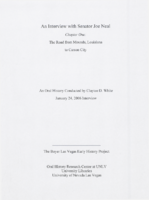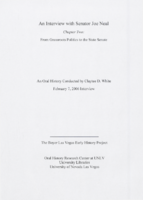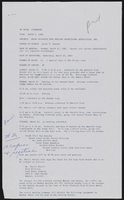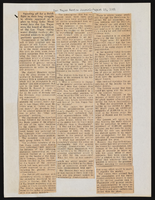Search the Special Collections and Archives Portal
Search Results
Shauna Hughes oral history interviews
Identifier
Abstract
Oral history interviews with Shauna Hughes conducted by Stefani Evans and Claytee D. White on August 31, 2016 and October 11, 2016 for the Building Las Vegas Oral History Project. In the first interview, Hughes discusses her early life in New York and later moving to Ohio. She talks about attending John Carroll University, moving to Las Vegas, Nevada in 1982, and being a founding member of the Southern Nevada Association of Women Attorneys. Hughes recalls being appointed Henderson City Attorney, the early development of Green Valley, and the rapid growth of that area. Hughes then describes the Pacific Engineering and Production Company of Nevada (PEPCON) explosion in 1988. In the second interview, Hughes discusses her work as Henderson City Attorney. She describes collaborating with elected city officials, the development of the Galleria Mall, and the establishment of Nevada State College (NSC). Lastly, Hughes talks about community support for new infrastructure in Henderson.
Archival Collection
Quincella Rivers oral history interview
Identifier
Abstract
Oral history interview with Quincella Rivers conducted by Claytee D. White on November 20, 2019 for the Boyer Early Las Vegas Oral History Project. Quincella Rivers began by talking about where she grew up, her family life and history with the arts, and her childhood. She recalls moving to Las Vegas, Nevada in 1979 to finish college at the University of Nevada, Las Vegas and talks about different jobs and organizations she has participated in. Rivers serves as co-chair of the Youth in Arts for Alpha Kappa Alpha (AKA) Sorority, President of the Las Vegas Society, Inc., Advisory Board of Forgotten Song Foundation, and sings with Sweet Adeline International. She talks about the histories of some of the organizations, how she helped out in each of them, what their goals were, and what they did for the community. Lastly, she talks about racism in Las Vegas in the past and her personal experience with racism and segregation.
Archival Collection
Frederic Apcar oral history interview
Identifier
Abstract
Oral history interview with Frederic Apcar conducted by Nancy Hardy on July 19, 2003 for the Las Vegas Oral History Project. In this interview, Apcar describes his birth and early life in Paris, France, his parents' divorce, working from a young age, and, at the age of sixteen learning to dance ballet and tap. He talks about his first dancing job at the Folies Bergere in Paris, going on tour for several years with Josephine Baker, and on his return to Paris, dancing with the Lido before signing a contract for a three-month job at the Copacabana in New York City, New York. He then discusses his move to Las Vegas, Nevada in 1959, where he produced the Las Vegas Les Folies Bergere, Vive les Girls with Ron Lewis, and Casino de Paris. He also talks about Donn Arden as the other major show producer on the Strip during this period.
Archival Collection
Amy Bush Herzer oral history interview
Identifier
Abstract
Oral history interview with Amy Bush Herzer conducted by Barbara Tabach on November 14, 2019 for the Remembering 1 October Oral History Project. Herzer begins the interview discussing her early life, education, and her current job as the University of Nevada, Las Vegas (UNLV) women's golf coach. She speaks about her family's history with golf, her personal history, and life with her husband, Kendall Herzer. After, she recalls where she was on the day of the October 1 shooting, and how she found out about the event, and recalls her husband reported to the main fire station as an Emergency Manager for the State of Nevada. She recalls keeping track of her athletes' whereabouts and letting their families know. Herzer describes how people reacted when she had brought a therapy dog, Apollo, in for the people donating blood and how the community came together to support each other and share resources as a community.
Archival Collection
Moniru Ravanipur oral history interviews
Identifier
Abstract
Oral history interviews with Moniru Ravanipur conducted by Claytee D. White on February 13, 2013, March 06, 2013, and April 24, 2013 for the Boyer Early Las Vegas Oral History Project. In these interviews, Ravanipur discusses her upbringing in Iran, her experience of the Iranian Revolution, and her writing, which ranges from fiction to autobiographical. Ravanipur describes living by the sea in the Persian Gulf, and how the religious beliefs of the people in that area differed from those of the Islamic Republic and the rest of Iran. She describes attending Tehran University during the revolution and being persecuted for her political beliefs, forcing her to flee to Kurdistan to escape possible execution. Ravanipur explains the history behind the Iranian Revolution and how she observed the country changing religiously and in its customs and norms, as well as the violence she witnessed. She concludes by describing how she became a prominent writer in Iran and internationally, and briefly describes applying for fellowship at University of Nevada, Las Vegas.
Archival Collection
George Durkin oral history interview
Identifier
Abstract
Oral history interview with George Durkin conducted by Claytee D. White on July 26, 2024 for the Boyer Early Las Vegas Oral History Project. In this interview, Durkin describes his childhood in Schenectady, New York, where he first became interested in music. After college, Durkin enrolled in a master's program at the University of Nevada, Las Vegas (UNLV) and worked at Strip locations behind some of the great entertainers in the industry. While at UNLV, he studied with composer, arranger, and musician Don Hannah, and became a life-long friend of his son, Paul Hannah. Durkin explains that while he currently works in real estate, he still plays in shows when possible and is a regular percussionist for the Las Vegas Philharmonic. Over the years, Durkin played for many entertainers in Las Vegas, including Robert Goulet, Dorothy Hamill, Julio Iglesias, Dionne Warwick, Liberace, Joan Rivers, Sammy Davis, George Burns, and many more. Digital audio available; no transcript available.
Archival Collection

Transcript of first interview with Senator Joe Neal by Claytee D. White, January 24, 2006
Date
Archival Collection
Description
First interview in a series of five with Nevada State Senator Joe Neal conducted by Claytee D. White on January 24, 2006. Born in Mounds, Louisiana, in 1935, Neal joined his family in Las Vegas as a young man shortly before serving in the United States Air Force from 1954 to 1958. Following his military service, he earned a bachelor's degree in political science at Southern University in Baton Rouge, Louisiana. Neal continued his education at the Institute of Applied Science in Chicago, Illinois, with postgraduate work in law. From 1973 to 2001, he served in the Nevada Legislature as the Senator from Clark County Senatorial District No. 4. In the first interview, Neal recalls his childhood, moving to Las Vegas as a teenager, and joining the Air Force. He discusses his early experiences in politics and his involvement in various issues.
Text

Transcript of second interview with Senator Joe Neal by Claytee D. White, February 7, 2006
Date
Archival Collection
Description
Second interview in a series of five with Nevada State Senator Joe Neal conducted by Claytee D. White on February 7, 2006. Born in Mounds, Louisiana, in 1935, Neal joined his family in Las Vegas as a young man shortly before serving in the United States Air Force from 1954 to 1958. Following his military service, he earned a bachelor's degree in political science at Southern University in Baton Rouge, Louisiana. Neal continued his education at the Institute of Applied Science in Chicago, Illinois, with postgraduate work in law. From 1973 to 2001, he served in the Nevada Legislature as the Senator from Clark County Senatorial District No. 4. In the second interview, Neal focuses on his work during the 1960s and 1970s.
Text


